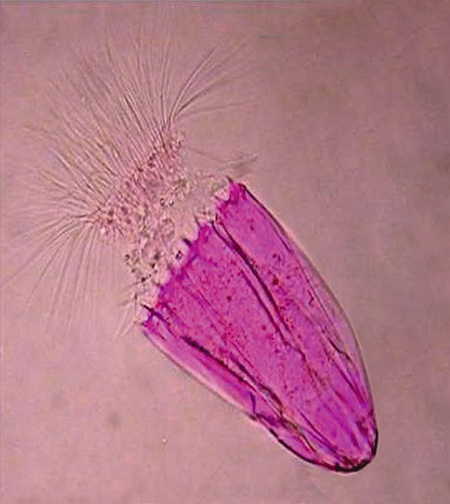
Microscope image of Sprinoloricus cinzia, one of the species living at the bottom of the L’Atalante basin, a hypersaline environment with almost no oxygen / © Danovaro et al., 2010; license: BioMed Central Ltd.
In the previous «Mètode spacecraft» we saw that seas with oceans of methane and ethane like those on the satellite Titan could be more abundant in the universe than those of water. On this subject, I recently had a discussion through letters with astrobiologist Chris McKay in which I argued that, should an alien invasion ever come to Earth, we would probably find that its chemistry is based on ethane. His answer was categorical: worlds with seas of water can develop atmospheres of oxygen, unlike seas of ethane and methane. And without oxygen you cannot develop complex life that can come to invade us, so the invaders will be water-based.
It is certainly a powerful argument, but it leaves a lot of room for speculation. Is it really not possible to develop an atmosphere with oxygen when there are no oxygen atoms in the solvent? Could this gas not be released from the oxides of the substrate by some alternative type of photosynthesis or chemosynthesis? On the other hand, is the presence of oxygen really indispensable for the emergence of complex multicellular life? Many studies argue that the presence of abundant oxygen in the atmosphere was a prerequisite for the emergence of complex life on Earth. Indeed, the Great Oxygenation Event occurred 2,450 million years ago and mitochondria (and eukaryotic cells with them) appeared shortly after. This organelle is the main source of ATP (adenosine triphosphate) in an organism, the universal energy molecule, which is created by the oxidisation of nutrients by oxygen. Mitochondria would have given organisms an energy boost that enabled them to colonise new ecosystems.
Even so, multicellular life took 1,000 million more years to appear. On the other hand, in 2010, in the L’Atalante basin, a deep-sea region of the Mediterranean with very low oxygen availability, multicellular animals of the Loricifera phylum were discovered, which live and thrive in total absence of oxygen. These animals’ bodies do not have mitochondria. Instead they have developed other organelles called hydrogenosomes that generate ATP without the need for oxygen, extracting atomic hydrogen from the environment and releasing molecular hydrogen (hence the name of the organelle). This opens up the possibility of a complex and energetically active life developing in a substrate such as methane or ethane.
«Is the presence of oxygen really indispensable for the emergence of complex multicellular life?»
On the other hand, can advanced technology develop without atmospheric oxygen? No oxygen would mean no fire and, in the case of the human species, mastering fire was essential for us to develop technology. The production of metal parts would not be possible without forges. Something similar would happen if there was oxygen but complex life never left the seas; however intelligent the cephalopods might become in the remote future, it is not easy to imagine them developing a technologically advanced civilisation if they remain confined to the sea. Or is it? An underwater civilisation could make good use of underwater volcanism as a source of heat with which to work metals.
On the other hand, sodium burns fiercely in chlorine, magnesium in CO2, fluorine produces combustion as well, and the XeF+ ion is one of the most oxidising substances. Therefore, are there alternatives to develop a civilisation without oxygen? Anyway, I have not yet replied to McKay, and he is possibly right. But if the universe has shown me something over the years, it is that, no matter how much we try to pigeonhole things into our excessively chauvinist vision, they always end up surprising us and forcing us to open our eyes to new unsuspected alternatives.





